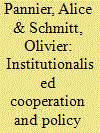|
|
|
Sort Order |
|
|
|
Items / Page
|
|
|
|
|
|
|
| Srl | Item |
| 1 |
ID:
153048


|
|
|
|
|
| Summary/Abstract |
The failed expedition of Suez in 1956 and France’s subsequent strategic ‘divorce’ from the United Kingdom and the United States lies at the heart of a policy paradigm that has dictated France’s defence posture from de Gaulle’s presidency to the end of the Cold War. Some crucial features of the Gaullist posture remain today enduring references for French presidents in the definition of France’s exceptionalism. While it is so, there have been significant changes since the 1990s when it comes to France’s strategic relations with the United States and the United Kingdom. This article demonstrates the extent and mechanisms of this rapprochement by analysing it through three dimensions of policy change: modes of action, institutional commitments and discourses. The article demonstrates the dimensions’ mutually reinforcing effects and argues that France’s exceptional posture has de facto been reversed.
|
|
|
|
|
|
|
|
|
|
|
|
|
|
|
|
| 2 |
ID:
131629


|
|
|
|
|
| Publication |
2014.
|
| Summary/Abstract |
What are the prospects for trilateral concord among Britain, France and Germany in terms of defence policies? Would more institutionalised links among them lead to more convergence of their defence policies? To answer these interrogations, this article investigates the relation between policy convergence and institutionalised cooperation, in particular by studying whether and when one is a prerequisite to the other. First, this article examines the extent to which these countries' defence policies have converged since the end of the cold war based on several indicators: their attitudes towards international forums, their defence budgets, the structure of their armed forces and their willingness to use force. Second, we study each of the bilateral relations between the three states to qualitatively analyse their degree of institutionalisation and the convergence of their defence policies. This article concludes that contrary to the arguments of many discussions, think-tank reports and political actors, there is no evidence that institutionalised cooperation leads to policy convergence as far as defence is concerned.
|
|
|
|
|
|
|
|
|
|
|
|
|
|
|
|
| 3 |
ID:
167130


|
|
|
|
|
| Summary/Abstract |
This article examines the ways in which recent military experiences have affected France's approach to the use of military power, the role of allies and its vision of future warfare. In its management of strategic challenges, we identify the persistence of many traits of France's historical habits and practices. France remains a distinct, outward looking, and militarily willing and able European power. However, the threats that France has sought to address and the operational and financial constraints it has faced in the past decade in particular, have led to significant changes in its approach to and conduct of warfare. In particular, the threat of Islamist terrorism has led to a reframing of French governments' priorities around more narrowly-defined national interests. It has translated into a ‘pragmatic’, or ‘realist’ turn in foreign policy, and a move from ‘wars of choice’ to ‘wars of necessity’. In this context, France's military alliances are being rethought around a core number of functional partnerships to compensate for capability gaps and military overstretch. Meanwhile, French armed forces are getting prepared to face the challenges posed by emerging technologies and the future of Great-Power competition. Overall, the multiple security challenges faced by successive French governments have confirmed, yet redefined, the contours of France's traditional dilemma between a desire for an autonomous defense policy and the reality of a necessary reliance on allies.
|
|
|
|
|
|
|
|
|
|
|
|
|
|
|
|
| 4 |
ID:
125098


|
|
|
|
|
| Publication |
2013.
|
| Summary/Abstract |
Cooperation occurs more often than conflict in the international system. However, its practicalities have been little conceptualised in International Relations. Through an empirical study of the workings of contemporary Franco-British cooperation in defence, this article offers a multidimensional analysis of interstate cooperation taking into account organisational, political, material and cognitive factors. By studying their centripetal and centrifugal effects, this article shows why each factor is relevant for understanding what favours and impedes the emergence and continuation of intergovernmental cooperation. It notably demonstrates how domestic interorganisational dynamics have an impact on relations with foreign partners. This article also shows how bridging the traditional divide between approaches based on interests and approaches based on beliefs allows us to identify the evolutionary dynamic of cooperation
|
|
|
|
|
|
|
|
|
|
|
|
|
|
|
|
|
|
|
|
|